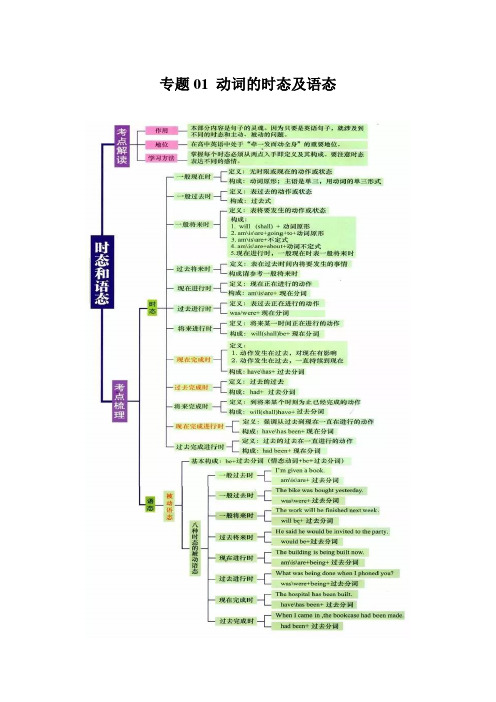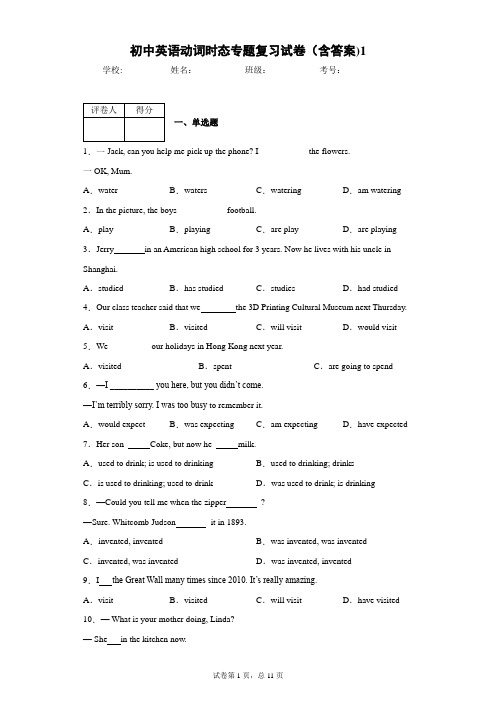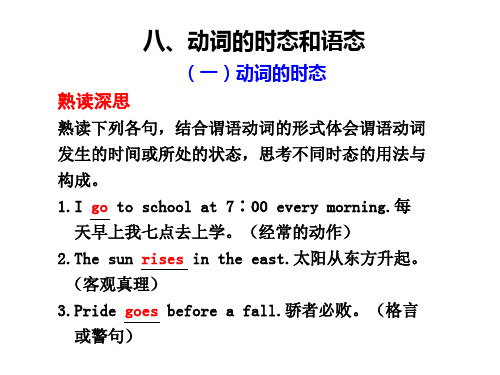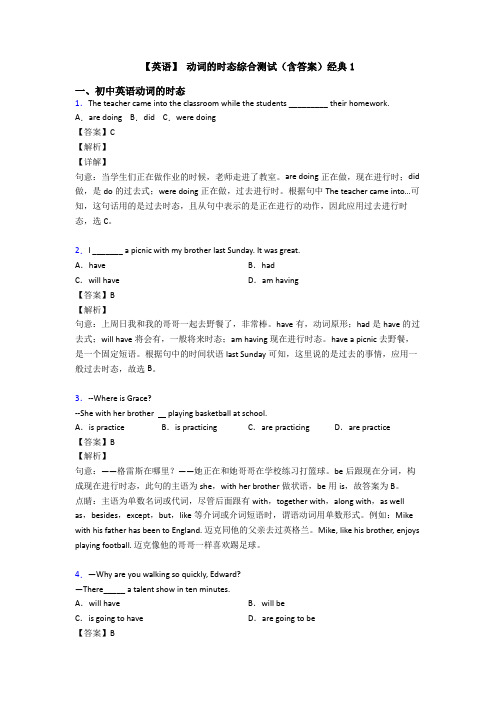动词时态复习(一)
- 格式:doc
- 大小:38.00 KB
- 文档页数:3




中考语法总复习专题12 动词时态(上)命题点一一般现在时►重点用法概括►易错点解读主将从现的“从”,仅限于状语从句,宾语从句不适用。
I don’t know if Lucy will go to Jack’s party next Sunday. If she goes, so will I.(前一个if,意为是否,引导宾语从句;后一个if,意为如果,引导状语从句)。
【例1】.(2021·吉林长春·模拟预测)The teacher told us that the sun ________ in the east. A.rises B.rise C.rose D.rising【例2】.(2021·天津和平·一模)To catch the first bus, Bob ________ up at six o’clock every morning.A.gets B.was getting C.is getting D.will get【例3】.(2021·广西柳州·中考真题)He________ like his brother.A.look B.looks C.looking【例4】.(2020·辽宁盘锦·中考真题)If our school __________ the pop singer to the concert next week, we will be happy.A.will invite B.invited C.invites D.is inviting【例5】.(2020·四川凉山·中考真题)—Let's go camping if it____________ next Saturday. —But nobody knows if it ___________.A.is fine; rains B.will be fine: rains C.is fine: will rain D.will be fine: will rain随堂练习1.(2021·北京朝阳·二模)Daming ________ books with his father at 8 o’clock every evening. A.reads B.read C.is reading D.has read2.(2021·河北·石家庄外国语学校一模)The wise men say reading ________ a bridge between our lives and the unknown world.A.built B.build C.builds D.has built3.(2021·四川遂宁·中考真题)The number of the whales ________ smaller and smaller because of human activities now.A.were B.was C.is D.are4.(2021·广西柳州·中考真题)He________ like his brother.A.look B.looks C.looking5.(2021·北京石景山·二模)My dad ________ young kids how to play football every Saturday. A.teaches B.taught C.have taught D.will teach6.(2021·湖北十堰·中考真题)Mid-Autumn Day usually _________ on August 15th in the lunar calendar(阴历)every year.A.come B.comes C.is coming D.will come7.(2021·天津和平·一模)To catch the first bus, Bob ________ up at six o’clock every morning. A.gets B.was getting C.is getting D.will get8.(2021·上海松江·二模)Tim likes watching films. He _________ to the cinema with his girlfriend once a week.A.goes B.is going C.has gone D.will go9.(2021·湖南·模拟预测)Not only his friends but also he ________ great interest in science fiction.A.show B.shows C.have shown10.(2021·广西·北海市教育教学研究室二模)Jimmy with his parents_______ the sick people once a week.A.helps B.help C.helping D.are helping11.(2021·北京房山·二模)My father is very patient. He often ________ me with my homework. A.helps B.helped C.will help D.has helped12.(2021·广西桂林·中考真题)The zebra eats grass, but it ________ eat meat.A.doesn’t B.didn’t C.don’t13.(2021·黑龙江·齐齐哈尔市碾子山区教师进修学校一模)—Do you like the flower? —Yes. It ________ sweet.A.is smelling B.smells C.smelt14.(2021·吉林长春·模拟预测)The teacher told us that the sun ________ in the east. A.rises B.rise C.rose D.rising15.(2021·北京丰台·二模)Claire likes cooking. She ________ delicious food every weekend. A.will cook B.has cooked C.is cooking D.cooks16.(2020·湖北恩施·中考真题)I hear that it often ________ in Sichuan and there are usually floods, especially in summer.A.rains B.rained C.will rain17.(2020·四川广元·中考真题)Tom. together with his friends, often________ to the old people's home to cheer the old up.A.go B.going C.goes18.(2021·北京房山·一模)—What does your mother like doing in her free time?—She often ________ movies.A.watches B.watched C.is watching D.will watch19.(2020·贵州毕节·中考真题)Don't get off the bus until it ________.A.will stop B.stop C.stopped D.stops20.(2021·北京房山·二模)Mary ________ her grandparents every weekend.A.visits B.was visiting C.is visiting D.has visited命题点二一般过去时►重点用法概括►易错点解读used to do sth 过去常常做某事(否定结构:didn’t use to do sth)be used to doing sth习惯于做某事He used go out with his parents, but now he is used to staying at home alone.他过去常和父母出去,但现在他习惯独自待在家里。

专题01 动词的时态及语态时态知识梳理重点用法1 一般现在时用法:1.be(am,is,are)动词的使用由主语的人称和数决定。
行为动词的第三人称单数加-s/es,其余人称用动词原形。
I am free tonight.我今晚有空。
The boy is ten years old.这个男孩10岁了。
They are students.他们是学生。
Bill often helps others.We like him a lot.比尔总是帮助他人。
我们很喜欢他。
2.表示经常、习惯性发生的动作或存在的状态。
It often rains in our city.我们的城市经常下雨。
3.表示普遍真理和客观真实。
The earth moves round the sun.地球围绕太阳转。
4.表示心理状态或情感的动词往往用一般现在时。
She hates rock music.她讨厌摇滚乐。
5.在时间、条件状语从句中表示将来的动作。
I will call on you as soon as I am free.我空闲时会去拜访你。
提示:一般现在时可以用来代替一般将来时,表示已经预先计划或安排的肯定将要发生的动作,句中常有表示将来时间的状语。
这一用法主要用于下列动词,如果arrive(到达),be (是),begin(开始),come(来到),go(去),leave(离开),reach(到达),start(出发)等。
The train leaves at eight o’clock.火车8点钟开车。
注意:一般现在时常用的时间状语有:today今天often经常always一直sometimes有时usually通常seldom很少on Sunday在星期天every day/week/morning每天/每周/每天早上重点用法2 一般过去时用法:1.be(was/were)动词的使用由主语的人称和数决定。
行为动词都要用过去式。

中考英语一轮复习专题知识梳理及练习—动词时态(一)一般现在时Simple Present Tense结构公式:am/is/are/do/does常见时间状语:sometimes, usually, never, always, often; every day / week / month / year / ... ; on Sunday (s) / Monday (s) /...1.经常性或习惯性的动作,如日常行为,常与表示频率的时间状语连用。
常用频度副词:every…/all the time >always>usually>often>sometimes>seldom≈rarely≈ hardly>never➢Life rarely turns out the way that we plan.生活几乎从不按招出牌。
2.表示按计划将会发生的事情,主语常常是物。
➢这列高速列车(高铁)早上9点出发去北京。
(high-speed train)The high-speed train leaves/heads/makes for Beijing at 9 am._3.表示真理或不变的事实。
➢树叶在秋季从绿变黄。
Leaves turn from green to yellow in autumn.4.在时间、条件、让步状语从句中,从句用一般现在时代替一般将来时,简称为“主将从现”。
➢如果我在纽约时有时间去购物,我会帮你去苹果店买个iPad 10。
I will buy you an iPad10 from the Apple Store if I have time to go shopping in New York.5.特别结构结构公式一:It is +一段时间+since +从句结构公式二:It has been+一段时间+since +从句♥Attention♥第一种句型更常见。


语法复习八:动词时态和语态(1)一、动词的分类和形式:动词是表示动作和状态的词。
动词有时态、语态和语气3种形式的变化。
1、动词按其能否独立作谓语而分为:“谓语动词”和“非谓语动词”两种2、动词的4种基本形式:动词原形、过去式、过去分词和现在分词。
3、动词按其构成动词词组作用分为:实义动词、连系动词、情态动词和助动词。
1)实义动词分为及物动词和不及物动词。
还可分为持续性动词和瞬间动词;2)连系动词有两种:一种表特征或状态,另一种表状态变化过程。
4、五种不同的短语动词:1)“动词+介词”;2)“动词+副词”;3)“动词+副词+介词”;4)“动词+名词(或代词)+介词”;5)“be+形容词(包括相当于形容词的过去分词+介词”。
二、动词的时态:1、一般现在时的用法:1)表示现在的习惯,经常发生的动作或存在的状态。
2)表示主语的特征、性格和能力。
3)表示客观事实或真理。
4)表示按照计划安排好的将来行为。
(只限于是go, come, leave, start, stop, be等开始或移动意义的词。
)2、一般过去时的用法:1)表示过去的动作或状态。
2)叙述过去连续发生的事情。
3)表示过去一段时间内经常发生的动作。
3、一般将来时的用法:1)表示将来的动作或状态。
2)表示将来的经常动作。
4、现在进行时的用法:1)表示说话时正在进行的动作。
2)表示现阶段正在进行的动作。
(说话时动作不一定进行。
)5、过去进行进的用法:1)过去某一时刻或某一段时间内正在进行的动作。
2)表示移动的动词:come, start, stay, leave, go等词的过去进行时可以表示过去的将来要发生的动作。
3)was going to do可以表示在过去某一时间之后发生的动作。
6、现在完成时的用法:1)表示刚刚完成的动作,常与just连用。
2)表示过去发生而持续到现在的动作或状态,甚至延续到将来。
常与since, for连用,但for, since 不能与终止性的动词连用。

语法复习一时态语态Goals:1)熟练掌握考纲要求的时态:一般(现在、过去、将来),进行(现在、过去、将来)完成(现在、过去、现在进行),过去将来时在具体语境中的运用。
能根据语境选用正确的时态2)弄清楚易混时态:一般过去时与现在完成时,一般过去时与过去完成时,现在完成时与现在完成进行时之间的区别,3)掌握被动语态的时态以及不能用被动语态的情况温馨提示:时态学习可以从这几方面入手:基本概念,标志词,基本结构,基本用法,特殊用法和与易混时态之间的辨析。
一.如何应对动词时态和语态的考查动词时态和语态的考查往往结合在一起。
解题时,应当要结合时间状语或上下文提示,分析题干句子的语境,确定正确的时态。
涉及语态的问题应考虑是不是主动表被动的情况二.在时态学习中需要关注的句型1)祈使句/名词或名词短语+and/or/otherwise+陈述句(________时)2)第几次做某事:this/It is the first/second/third... time that sb have done sththis/It was the first/second/third... time that sb_________3)是时候做... It is (high) time that sb_______________________我们是时候出发了。
________________________________________4)No sooner.... than...5)Hardly/scarecely... When, than和when从句使用__________主句使用____________eg: 我刚到家大雨就倾盆而下。
_______________________________________6)This(That / It)is the best / finest / most interesting…+that+现在完成时(11湖南)It is the most instructive that I ________________ (attend)三.基本时态现在过去将来过去将来一般一般现在时Be(am /is/are) /do 一般过去时Was/were did一般将来时Will do一般过去将来时Would do sth进行现在进行时Am/is/are+ doing 过去进行时____________将来进行时____________Would be doing完成现在完成时Have/has done sth 过去完成时____________将来完成时____________过去将来完成时Would have done完成进行现在完成进行时have/has been doing sth 过去完成进行时____________Will have beendoingWould have beendoing一).一般体主动结构:be(am/is/are)/ doA. 一般现在时被动结构:____________特殊用法:一般现在时表示将来1.主将从现:在时间(when/before/until/as soon as/the moment/once)、条件(if/unless/even if)、让步状语(no matter+疑问词、疑问词+ever)从句中,如果主句中的动词用一般将来时,从句中的动词通常用一般现在时,而不用将来时态。


【英语】动词的时态综合测试(含答案)经典1一、初中英语动词的时态1.The teacher came into the classroom while the students _________ their homework. A.are doing B.did C.were doing【答案】C【解析】【详解】句意:当学生们正在做作业的时候,老师走进了教室。
are doing正在做,现在进行时;did 做,是do的过去式;were doing正在做,过去进行时。
根据句中The teacher came into…可知,这句话用的是过去时态,且从句中表示的是正在进行的动作,因此应用过去进行时态,选C。
2.I _______ a picnic with my brother last Sunday. It was great.A.have B.hadC.will have D.am having【答案】B【解析】句意:上周日我和我的哥哥一起去野餐了,非常棒。
have有,动词原形;had是have的过去式;will have将会有,一般将来时态;am having现在进行时态。
have a picnic去野餐,是一个固定短语。
根据句中的时间状语last Sunday可知,这里说的是过去的事情,应用一般过去时态,故选B。
3.--Where is Grace?--She with her brother playing basketball at school.A.is practice B.is practicing C.are practicing D.are practice【答案】B【解析】句意:——格雷斯在哪里?——她正在和她哥哥在学校练习打篮球。
be后跟现在分词,构成现在进行时态,此句的主语为she,with her brother做状语,be用is,故答案为B。
点睛:主语为单数名词或代词,尽管后面跟有with,together with,along with,as well as,besides,except,but,like等介词或介词短语时,谓语动词用单数形式。

一、选择题1.My mother when I got home yesterday.A.will cook B.cooks C.has cooked D.was cooking2.Becky took a photo of her friends while they _________ computer games.A.play B.are playing C.were playing D.have played 3.— Where can I find Jack?— He __________ to the post office.A.goes B.has gone C.has been D.will go 4.— How about going for a drive, Mike?— One moment, please! I __________ cleaning our room soon.A.will finish B.have finished C.finish D.finishes 5.—Mom, can you teach me how to pronounce the words?—Wait a minute. I ________.A.am cooking B.cookC.cooked D.will cook6.Boys and girls, there ________an English speech competition in two weeks.A.will have B.has C.is going to be D.are going to be 7.My mother _____ dinner when I got home yesterday.A.has cooked B.was cooking C.will cook D.cooks 8.Which of the following is right?A.He is used to live there.B.My main job is spreading the message about protecting the environment.C.I have borrowed the book from the library for two weeks.D.Kids under 18 are not allowed to drive.9.My mother will be very angry with me when she out where I have been.A.finds B.found C.will find D.has found 10.— Morning, Mike! Did you sleep well last night?— Yes. I went to bed at 9:30 because there ______ a math test this afternoon.A.was B.will be C.is going to have 11.—I don’t understand why you didn’t go to the lecture yesterday afternoon.—I’m so sorry. But I my homework.A.had done B.was doing C.would do D.am doing12.Mr Hu a ________ to Japan. He’ll come back in two weeks.A.goes B.went C.has gone D.will go 13.—I'm sorry. There was too much traffic on the road.—Never mind. The meeting________for only 5 minutes.A.has begun B.has stopped C.has been on14.It only __________ him 20 minutes __________ to his office every day.A.takes;to drive B.take;drive C.takes;drive15.— Who ________the classroom tomorrow, Tony?— Our group.A.will clean B.cleans C.cleaned D.clean16.Miss Smith in our school since five years ago.A.teaches B.taught C.has taught D.is teaching17.— Look after yourself on your way to Gungzhou,dear.— OK, mom.I will call you________get there.A.as soon as B.so that C.because18.If Tina _____ at home tomorrow, I _____ her.A.is staying, will visit B.stays, will visit C.will stay, visit19.Look at Amy. She ________ for the school bus.A.wait B.is waiting C.waits D.waiting20.The film Operation Red Sea_____a lot of praise since its first show months ago.A.wins B.win C.will win D.has won21.It’s not your turn yet. Please wait on the chair until you________.A.have called B.will call C.are calling D.are called 22.Mr. Smith ______ our school next year.A.will visit B.visits C.was visiting D.visited23.—Did you hear the strange noise next door around 9 o’clock last night?— No, I ________my favourite film in my bedroom.A.watch B.watched C.am watching D.was watching 24.Sandy likes ________ TV. She ________ TV every day.A.watching; watching B.watch; watchesC.to watch; is watching D.watching; watches25.Doctor Ray, as well as other scientists __________ trees for nearly 15 years, but they know only a little about them.A.study B.studies C.has studied D.have studied【参考答案】***试卷处理标记,请不要删除一、选择题1.D解析:D【解析】句意:当我昨天回到家的时候,我的妈妈正在做饭。




语法复习(一)动词的时态与语态—、动词的时态一般现在时-1.1 read En glish every morning. He likes play ing football. He is very happy.2. I lear ned that the earth goes aro und the sun whe n I was in primary school. Pride goes before a fall.3. Wen meets journalists.4. The train starts at eight in the morning.5. If it rains, I won 'go out. I ' not go uni ess I am in vited. Tell him the n ews as soon as he comes6. Nowadays, whenever you turn on the TV , you will see a lot of commercials.练习:—1. Mr. Wu ______ to work by bus every dayA. has bee n traveli ngB. has traveledC. travelsD. is traveli ng2. Shan ghai ____ on the Huan gpu River.A. sta ndB. sta ndsC. is being sta ndD. has stood3. I don ' t think she ' ll be upsetsbether in case ____________A. she ' llB. she isC. she doesD. she would4. Every time he _ me, he makes fun of me.A. will seeB. seesC. is see ingD. is see n5. The train _____ at eight toni ght.A. will be startedB. will have startedC. shall be startedD. starts6. Turn on the television or open a magazine and you __ a dvertisements showing happy familiesA. will ofte n seeB. ofte n seeC. are ofte n see ingD. have ofte n see n7. It ___ long before we ____ the result of the experime nt.A. will not be, will knowB. is, will knowC. will not be, knowD. is, know8. This machine ______ . It hasn ' t worked for years.A. didn ' t workB. wasn ' t workingC. doesn ' t workD. isn ' t working9. Look at the timetable. Hurry up! Flight 4025 ____ off at 18:20.A. takesB. tookC. will be take nD. has take n一般过去时1. He often cried when he was a child.She went to the cin ema once a week whe n she was at school.They went to the bank just now.2. I did n't know you were here. Sorry, I forgot to bring my book.3. He promised to buy me a computer if he got a rise.4. When he was young, he used to swim in the sea.5. When ever it was Sun day, he would get up very late.6. Could you lend me your bike? Did you want anything else? I won dered if you could help me.It is time you went to bed (你早该睡觉了。

常用英语时态总复习按构成和状态可分四类:一般时(单个V原/ V-ed,可借助于助动词do[多形] + V原构成否定句和疑问句)、进行时(借助于助动词be[多形]+V-ing)、将来时(借助于助动词will[多形]+ V原)、完成时(借助于助动词have[多形]+ V-ed)动词时态一:一般现在时①表示经常或习惯性的动作或存在的状态。
②表示主语通常的能力、兴趣爱好、和性格特征。
③表示客观的事实或真理。
④表示按照时刻表或已经计划安排好的将来行为。
(只限于是go, come, leave, arrive, begin, start, take off, stop, be等表示开始或移动意义的词。
)⑤在时间状语从句和条件状语从句中,主句用一般将来时(will+动词原形),从句中用一般现在时表将来。
当主语是第三人称时,谓语动词要用第三人称单数形式,加-s/es。
除此之外都用动词原形。
1.He______(be, am, is, are) a teacher at No. 2 Middle School.2.He______(have, has) classes in the afternoon.3.He______(get, gets) up at half past six every morning.4.He always _____(come, comes ) to school on time.5.He ______(study, studies) very hard at his lesson.6.One and two _____(be, is, are) three.7.Blue and yellow _____(make, makes) green.8.The earth _____(move, moves) round the sun.9.I will go there if I ____( be, will be, am, is, are) free tomorrow.10.I will go there when I _____(have, will have, has) time tomorrow.11.He won’t come to the party unless he _____(be, will be, am, is, are) invited.12.I’ll wait here until my mother ____(come, comes, will come) back.13.Please return the book to the library as soon as you ______(finish, finishes, will finish) reading it.14.Once you _____(see, sees, will see) him, you will never forget him.时间状语:--- sometimes/often/usually/always/now/never/seldom/every morning/once a month---动词时态二:一般过去时(提示:使用动词的过去式)表示具体的某个过去时间所发生的动作或所处的状态。

初中英语八种时态归纳复习(一)一般现在时(一)定义表示经常性或习惯性的动作,或存在的状态,还表示主语具备的性格和能力及客观真理。
例:I get up at 6:30 in the morning . She is at home .(二)构成主要用动词原形表示,当主语是第三人称单数时,在动词词尾加s/es。
(三)句型1、肯定句:主语+谓语+其他。
She reads English everyday.2、否定句:主语+don’t/doesn’t+谓语+其他。
He doesn’t get up at 6:30 in the morning.3、一般疑问句:Do/Does+主语+V原+其他?Do you like English? Yes, I do. /No, I don’t.4、特殊疑问句:特殊疑问词+do/does+主语+V原+其他?What time do you get up every morning?Where does your father work?(三)用法1、表示经常性或习惯性的动作,或存在的状态,带与表示频率的时间状语如:often , sometimes , usually,always , everyday year,month...), once/twice a week (month, year, etc.), seldom, on Sundays等连用。
I leave home for school at seven every morning.2、表示客观真理,科学事实、格言警句。
The sun rises in the east .日出东方。
The earth goes around the sun .地球绕着太阳转。
Ten minus two is eight.十减二等于八。
Light travels faster than sound .光的速度比声音的速度快。

动词的各种时态归纳一、一般现在时构成:主语+谓语(主谓一致,需注意主语为单三时,谓语动词用单三) 时间状语:常与表示频率的时间状语连用,如usually, often, always, sometimes,never, every day, once a week 等.用法:⑴表示经常发生或习惯性的动作或状态.eg: He always goes to work by subway.他总是乘地铁去上班.I visit my grandmother once a week.我一周去看望一次我的祖母.Mary does exercise every day.玛丽每天做运动.(2)表示客观事实或普遍真理,也用在格言中.eg: Light travels faster than sound.光比声音传播的快.Pride goes before a fall.骄傲使人失败.⑶表示按方案或时间表将要发生的事儿,其后常跟表示将来的时间状语. The plane takes off at four PM.飞机下午4点起飞.When does the school begin?学校什么时候开学?(4)表示主语现在的特征性格或状态.Jenny loves music.珍妮喜欢音乐.She lives in a small apartment.他住在一套小公寓里.(5)一些表示心理意识的动词,如know, understand, remember等无进行时,只能用一般现在时表示现在发生的具体行为.eg: I still remember the frightening experience on the island.我仍然记得在那个岛上的可怕经历.⑹在时间和条件状语从句中代替一般将来时.eg: I'll think about it when I write my report.我写报告时会对此予以考虑的.If he comes, I'll let you know as soon as possible.如果他来的话,我会尽快让你知道.二、现在进行时构成:主iu+be+doing时间状语:常与now, right now, at present, at the moment 等时间状语及look, listen等标志词连用.用法:⑴表示说话时正在进行的动作.eg: We are waiting for the subway at the moment.我们现在正在等地铁.Listen! Somebody is singing.听!有人在唱歌.⑵表示现阶段正在进行,而此刻不一定在进行的动作.成语表示一段时间的状语连用,如these days, this week等.eg: How are you getting on with your classmates these days?这些天你和同班同学相处的如何?We are studying French this semester.我们这学期学习语法.⑶某些非延续性动词可以用现在进行时表示即将发生的动作.常用的这类动词有come, go, leave, arrive, start, finish, die 等.这时剧中一般有表示将来的时间状语.eg: They are living by train tonight.他们今晚坐火车走.We are starting work at 8 o'clock next month.下个月我们将8点开始上班.(4)表达特定的感情色彩.现在进行时常与always, continually, constantly, forever等表示频率的副词连用,表示重复的动作,常含有厌烦,不满,抱怨,赞扬等感情色彩.试比拟:She is always scolding her child.她总是训斥自己的孩子.〔不满〕She always scolds her children.他总是训斥自己的孩子.〔事实〕He is constantly doing good work at school.他在学校总是成绩优秀.〔赞扬〕He does good work at school.他在学校成绩优秀.〔事实〕三、现在完成时构成:主语+ha ve/has+done标志词:常与already, just, yet, before, recently, so far, ever, never, once 等连用.用法:⑴表示过去发生的动作,对现在造成的影响或结果.eg: They have already learned two languages.他们己经学会了两种语言.He hasn't made a remark on the structure yet.他尚未对该结构发表评论.I have seen the linguist only once this year.我今年只见过那位语言学家一次.⑵表示从过去某一时间开始持续到现在的动作或状态.常与表示一段时间的状语连用,如so far, up to now, for a long time, for years, since 2021, in the past/ last five years, these days 等. eg: Tom and mary have been friends for years.汤姆和玛丽是多年的朋友.He has lived in London since 2000.自从2000年以来他就住在伦敦.How many words have you learned these days?这些天你学会了多少单词?⑶在时间和条件状语从句中代替将来完成时.eg: I will go to the party as soon as I have finished my homework.我一完成作业就去参加聚会.I will not believe you unless I have seen it with my own eyes.除非亲眼看到,否那么我是不会相信你的.(4)在This/ It is the first /second time that 句式中,that 从句用现在完成时. eg: It's the first time that I have come to Harvard University.这是我第1次来哈佛大学.四、一般过去时构成:主语+动词过去式时间状语:yesterday, last..., ...ago, in+过去年份等.用法:(1)表示过去某个特定时间发生的动作或存在的状态.eg: He offered his seat to an old man.他把他的座位让给了一位老人.He had a nice encounter with that girl last week.上周我与那个女孩有一次美丽的邂逅.⑵表示过去某一段时间内经常性或习惯性的动作.eg: When I was a teenager, I played table tennis almost every day.我十几岁时几乎每天都打乒乓球.⑶在时间和条件状语从句中代替过去将来时.eg: They said they would let us know if they heard any news about him.他们说如果听到关于他的任何消息,他们就会通知我们.五、一般将来时构成:主语+shall/will+动词原形时间状语:常与tomorrow, next week, in the future, in a few days等时间状语连用.用法:表示将要发生的动作或存在的状态.eg: I shall leave for London tomorrow.我明天要去伦敦.A simple test will show if this is real gold.一个简单的测试将会证实这是不是真金.其他表达方式:(1)be going to do表示打算方案安排要做某事,或有迹象说明要发生某事.eg: What are you going to do during the summer holiday?暑假你打算做什么?Look at the dark clouds! It's going to rain.瞧那些乌云!就要下雨了.(2)be about to do表示即将发生的动作,一般不与具体的时间状语连用.eg: Be quiet! The lecture is about to start.安静!讲座马上就要开始了.⑶ be to do表示根据约定责任义务或要求等即将发生的动作. eg: We are to meet at the school gate.我们约好在校门口见.。
动词时态复习(一)
一、一般现在时
1. 表示习惯性的动作,常与always, never, every day, often, sometimes等连用。
如:The postman always calls at 7:30.
2. 表示主语的特征、性格或能力。
如:
Ellen is an honest girl, and you can trust her.
Jack writes good English but does not speak well.
3. 表示不受时间限制的客观存在,如客观真理、格言、科学事实等。
如:
Facts speak louder than words.
Food easily goes bad in hot weather.
4. 在时间和条件状语从句中代替一般将来时。
如:
Where will you stay when you get to San Francisco?
I'll pay you double if you finish the work by Friday.
5. 表示按规定、计划、安排发生的动作,常用动词有go, come, arrive, leave, start 等。
如:
The flight for Shanghai leaves at 8:30 tomorrow morning.
二、现在进行时(构成形式为:am / is / are +动词-ing形式)
1. 表示说话时正在进行的动作或发生的事。
如:
The children are making a snowman in the yard now.
2. 表示现阶段正在发生的事,此刻不一定在进行。
常用的时间状语有these days, this week, at present等。
如:
We are preparing for the coming exam these days.
3. 表示一个按计划即将发生的动作,所用动词多是转移动词,如arrive, come, go, leave, return等。
如:
The headmaster is leaving for Beijing this weekend.
4. 表示经常性的动作,常与always, forever等连用,表示赞叹、厌烦等情绪。
如:David is always helping others.
Why are you forever asking questions?
三、一般将来时
▲其构成形式之一为:shall(第一人称)/ will(所有人称)+动词原形,表示将要发生的事,但这种将来意义常带有说话人的主观态度和看法。
如:
You will feel better after taking this medicine.
This time next week I shall / will be in Scotland.
▲另一种构成形式为:be (am / is / are) going to +动词原形
1. 表示“意图”,即打算将来做某事。
如:
Are you going to post that letter by airmail?
2. 表示“预见”,即现在已有的迹象表明将要发生某种情况。
如:
Look! Here come the dark clouds. It is going to rain.
四、现在完成时(构成形式为:have / has +动词-ed形式)
1. 表示过去发生的动作对现在有影响,常与already, yet, never, recently, ever等连用。
如:
They have spent nearly a billion dollars on it already.
2. 表示过去已经开始,持续到现在(可能还会继续下去)的动作或状态,常与since, “for +一段时间”, so far, in recent years等连用。
如:
I have known Joanna since she was born.
3. 在时间和条件状语从句中,表示将来某时已经完成的动作。
如:
Frank will return me the book if he has finished reading it.
【即学即练】
I. 选用括号内合适的内容填空。
1. It ________ (has rained / rains) every day so far this month.
2. This is the second time that I ________ (am / have been) to Paris.
3. He is never satisfied. He ________ (will always complain / is always complaining).
4. Long ago, people didn't know the earth ________ (moves / moved) around the sun.
5. The market ________ (rises / will rise) and ________ (falls / will fall) as its internal feature.
6. —This letter is in French, and I don't speak a word of French. Can you help me? —Sure. I ________ (have translated / will translate) it for you.
II. 选用括号内合适的内容完成下面短文。
Dear Nick,
We 1. ________ (had / are having) a wonderful time here in Prague. We 2.
________ (have been / will be) here for three days now and we 3. ________ (have decided / will decide) to stay for the rest of the week because we 4. ________ (will enjoy / are enjoying) ourselves so much. We 5. ________ (have seen / will see)
the Charles Bridge and the Castle, and this morning we 6. ________ (walked / were walking) around other historic places, including Kafka's house. We 7. ________ (haven't bought / won't buy) any souvenirs yet, but we 8. ________ (have visited / are visiting) some good art galleries and shops. Fortunately, the weather 9. ________ (hasn't been / is) too cold so far. People 10. ________ (will say / say) it can be really bad at this time of year and of course it often 11. ________ (snowed / snows) heavily here! As this is the first time we 12. ________ (have been / are) to Prague, we 13.
________ (think / will think) that we're just lucky.
See you soon.
答案
【即学即练】
I. 1. has rained 2. have been
3. is always complaining
4. moves
5. rises; falls
6. will translate
II. 1. are having 2. have been
3. have decided
4. are enjoying
5. have seen
6. walked
7. haven't bought 8. have visited
9. hasn't been 10. say
11. snows 12. have been
13. think。